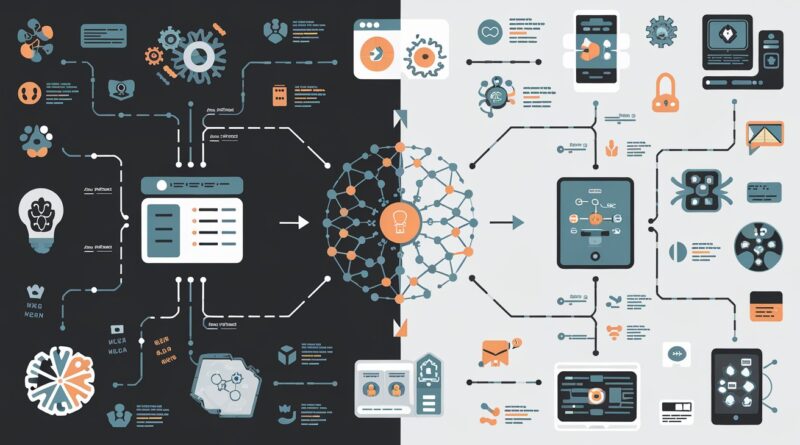What is Federated Learning? The Future of Privacy in AI and ML
Introduction: Understanding Federated Learning
The rapid growth of artificial intelligence (AI) and machine learning (ML) has raised significant concerns about data privacy. As AI-powered systems become more integrated into our daily lives, the need for data privacy becomes more pressing. One emerging solution that addresses these concerns is federated learning.
In this article, we will explore what federated learning is, how it works, and why it is crucial for the future of privacy in AI and ML. We will also dive into its various applications, especially in the fields of Generative AI services and Natural Language Processing (NLP), where data security is paramount.
What is Federated Learning?
Federated learning is a decentralized approach to training machine learning models. Unlike traditional machine learning, where data is gathered in a central server for analysis, federated learning allows data to stay on the device where it is generated. The model is trained locally on each device, and only updates to the model are sent back to a central server.
The primary benefit of federated learning is that it helps protect sensitive data. Instead of sending raw data to a server, only model updates — which are statistical data — are shared, ensuring that private information remains secure.
This technique can be particularly useful in applications like healthcare, finance, and mobile devices, where personal data privacy is crucial. By keeping data decentralized, federated learning reduces the risk of data breaches and enhances trust between users and service providers.
How Does Federated Learning Work?
Federated learning typically works in the following steps:
- Model Initialization: A central server initializes a machine learning model and sends it to multiple devices (e.g., smartphones, IoT devices).
- Local Training: Each device trains the model using local data stored on it. The data never leaves the device, ensuring privacy.
- Model Update: After local training, each device sends only the model updates — such as the weights and gradients — to the central server.
- Aggregation: The central server aggregates the model updates from all devices and creates a new, improved version of the model.
- Iteration: This process repeats until the model achieves the desired accuracy.
Through this process, federated learning enables the development of robust AI models without the need for sensitive data to be shared or stored in centralized locations.
Why is Federated Learning Important for Privacy?
The increasing use of AI and ML in industries like healthcare, banking, and retail requires access to vast amounts of sensitive data. However, the collection and storage of this data in centralized servers pose significant privacy risks. Federated learning addresses these concerns by ensuring that personal data never leaves the device. Here are some key reasons why federated learning is important for privacy:
- Data remains on the device: Since data never leaves the device, there is no risk of it being exposed through a centralized data breach.
- Decentralized Training: The decentralized nature of federated learning reduces the risk of large-scale data theft, as there is no central repository that can be hacked.
- Reduced Data Collection: With federated learning, only model updates (rather than raw data) are shared, minimizing the amount of personal data exchanged.
- Enhanced User Control: Users have more control over their own data, as it remains on their devices, and they can choose which data to share (if necessary).
Federated learning allows businesses to build machine learning models that can perform at a high level while respecting user privacy and complying with data protection regulations like GDPR.
Federated Learning Applications
Federated learning is already being used in various industries, and its applications continue to grow. Below are some notable use cases:
- Healthcare: Federated learning can be applied to train AI models using medical data without exposing sensitive health information. Hospitals, clinics, and research institutions can collaborate to develop AI-driven diagnostic tools while ensuring patient privacy.
- Mobile Devices: Mobile phone manufacturers like Apple and Google have embraced federated learning for improving predictive text, voice recognition, and other features without needing to access user data. Federated learning allows these companies to improve AI models while maintaining data privacy.
- Finance: In the financial sector, federated learning can enable banks and financial institutions to develop credit scoring models and fraud detection algorithms without compromising customer data privacy. Banks can collaborate on AI solutions without needing to share sensitive information across institutions.
- IoT and Smart Devices: IoT devices, such as smart home assistants and wearable health devices, generate vast amounts of data. Federated learning enables these devices to train AI models locally, improving performance without exposing private data to third parties.
Benefits of Federated Learning
Federated learning brings several key benefits to organizations and users alike:
- Improved Privacy: By keeping data on the device, federated learning minimizes the risk of data leaks and protects user privacy.
- Data Sovereignty: Federated learning allows organizations to comply with regional data protection regulations, such as GDPR and CCPA, by keeping data within the geographical boundaries where it was generated.
- Efficiency: Federated learning enables the development of machine learning models without the need for massive centralized data storage, which can be both costly and inefficient.
- Collaboration without Data Sharing: Federated learning enables collaboration between multiple entities (e.g., hospitals, banks, or tech companies) without sharing sensitive data, allowing the creation of powerful AI models while respecting privacy.
The Future of Federated Learning
As the demand for AI and ML solutions grows across industries, federated learning will play an increasingly important role in ensuring data privacy and security. Here are a few trends to watch for in the future of federated learning:
- Integration with Generative AI: As generative AI services advance, federated learning will likely become a crucial tool in training generative models on distributed data. This will allow businesses to create personalized AI models without compromising the privacy of user data.
- Increased Adoption in NLP: Federated learning holds significant potential for Natural Language Processing (NLP) development. NLP models can be trained on decentralized data from users without compromising sensitive information, opening up new opportunities for AI-powered communication tools that respect privacy.
- Collaboration between AI ML Development Companies: As federated learning gains more traction, AI ML development companies will look to adopt this technology to ensure that their AI solutions are both effective and privacy-conscious. Companies will work together to improve models without exchanging raw data, fostering innovation in a secure environment.
- Enhanced Security Protocols: With federated learning, data security will be paramount. Researchers and companies will continue to refine security protocols, such as encryption and differential privacy, to ensure that federated learning models remain robust and secure.
Conclusion
Federated learning represents a significant advancement in the field of AI and machine learning. By enabling machine learning models to be trained on decentralized data, it ensures that privacy remains a top priority. As industries continue to integrate AI into their operations, federated learning will play an essential role in addressing privacy concerns while allowing for the development of powerful, collaborative AI models.
For businesses looking to adopt federated learning and other cutting-edge AI techniques, partnering with an AI ML development company that understands the complexities of data privacy and security is crucial. Whether you are interested in generative AI services for content creation or seeking NLP development services to enhance communication tools, federated learning is paving the way for a future where privacy and innovation go hand in hand.




